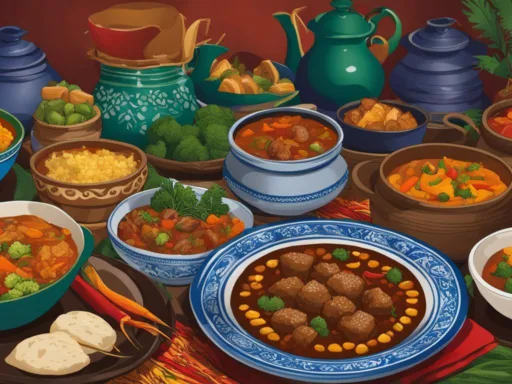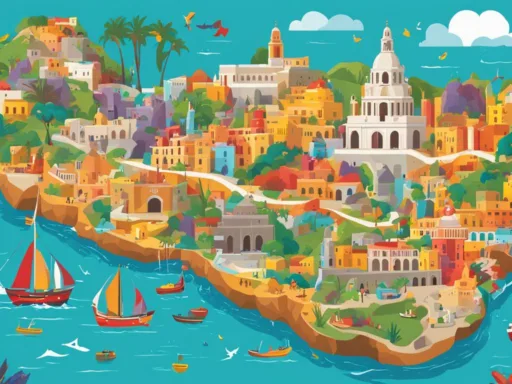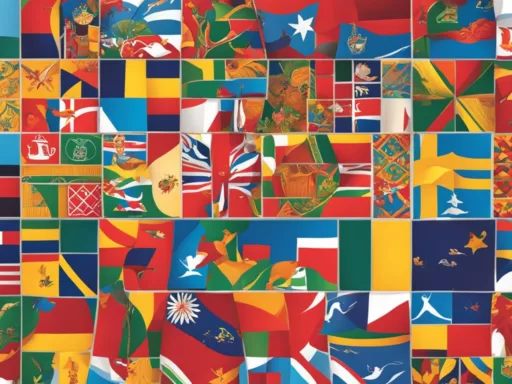Within the heart of Central Africa, Gabon emerges as a nation rich in linguistic diversity, an embodiment of the region’s complex tapestry of tongues. As travelers venture into its verdant landscapes, they encounter a melodious symphony of languages spoken in Gabon, each narrating a different chapter of the country’s heritage. While French elegantly flows as the official language—an echo of historical ties—Gabonese voices also resonate with the rhythmic cadences of Fang, the predominant mother tongue that binds the community with threads of shared ancestry.
This intricate weave of linguistic diversity in Gabon is not merely about communication but represents the living soul of the country’s culture, with about 40 Bantu languages lending their distinct inflections to the chorus. These indigenous dialects, lacking formal written forms, are cherished and perpetuated through generation-spanning oral traditions. Their persistence is a testament to Gabon’s multifaceted linguistic identity, a dynamic landscape ever enriched by its people’s commitment to preserving their native lexicons.
Understanding the linguistic diversity in Gabon is akin to unraveling a complex puzzle where each piece is as crucial as it is distinctive. Despite the dominance of French, the heart of Gabon beats in multiple linguistic rhythms, from the bustling streets of Libreville to the serene villages nestled within the rainforest. The mosaic of languages is not just a mere facet of communication but the very fabric that weaves together the nation’s identity, history, and spirit.
Key Takeaways
- Gabon’s multilingualism reflects its rich cultural tapestry.
- French serves as the official and predominant instructional language.
- The Fang language is the most widely spoken indigenous tongue.
- Approximately 40 Bantu languages are orally preserved in Gabon.
- Indigenous languages in Gabon showcase the country’s vibrant heritage.
The Official Language of Gabon: French
Lingua franca of the Gabonese Republic, French’s prominence as one of the official languages in Gabon permeates every facet of national identity. From the grandiose halls of administrative power to the lively corridors of education, French asserts its influence, acting as a pivotal axis around which the Gabonese language landscape revolves.
French as a Lingua Franca in Education and Administration
Tracing the contours of the French language’s role in Gabon reveals its dual function as both the governmental standard and the educational cornerstone. Ensconced within the framework of Gabon’s societal structure, French acts not merely as a means of communication but as a vehicular language that advances administrative coherence and scholastic uniformity across diverse ethnic backgrounds.
The Rise of French Literacy Post-World War II
Following the cessation of global conflict in the mid-20th century, France initiated a concerted effort to uplift educational standards in Gabon, emphasizing the indispensability of French literacy. This strategic push bore fruit, with subsequent decades witnessing the literacy rate in French balloon to an estimated 60%. The Gabon language statistics present a narrative not just of ascension but of integration, with an impressive 80% of Gabon’s populace attaining competence in French and solidifying it as the linguistic heart of the nation.

Gabon’s accord with the Francophone realm is discernible through the lens of demography, notably in the capital of Libreville, where a significant one-third of residents take pride in their status as native French speakers. This enduring relationship is further cemented by French nationals residing in Gabon and the continued cultural and commercial imprints of France, ensuring that the French language remains deeply woven into the very tapestry of Gabonese life.
In a tableau of language use that both venerates the past and embraces the present, Gabon finds its unique voice—a chorus rich with the harmonies of its indigenous tongues yet led by the clear, resonant sound of the French articulation. May the French language, as part of Gabon’s multilingual odyssey, continue to convey the shared stories and aspirations of its people.
Languages Spoken in Gabon: A Look at the Linguistic Landscape
The linguistic tapestry of Gabon is as rich and varied as its cultural heritage. The tapestry features an amalgamation of languages spoken in Gabon, showcasing a remarkable blend of the official French language with an impressive variety of indigenous Bantu languages. This mix reflects the diverse language communities in Gabon, each contributing their distinctive tones to the nation’s linguistic melody.

In the urbane milieu of Libreville, the capital, French is not only a remnant of colonial legacy but also the primary medium of corporate and academic discourse. Yet beyond the high-rise buildings and academic institutions lies a different reality – an array of ethnic groups conversing in the harmonious but complex Bantu languages that have thrived in Gabon for some two millennia.
Gabon language diversity comes to the fore when exploring the inner workings of the society. In this diverse panorama, languages such as Fang, Mbere, and Sira (Eshira) are not mere modes of communication but instruments preserving the essence of ethnic identities. Each of these languages boasts a considerable proportion of Gabon’s cognoscenti, rendering roughly 25–30% of Gabon’s inhabitants as native speakers.
Fang, in particular, holds a special place as a nexus that enriches Gabon’s multilingual society. It serves as a lingual bridge that connects various language communities in Gabon, carrying the tales and traditions of a significant portion of the populace.
| Language | Percentage of Native Speakers | Geographical Concentration |
|---|---|---|
| Fang | ~32% | Mostly in Northern Gabon and the capital city, Libreville |
| Mbere | 25-30% | Scattered across Gabon; Strong presence in small communities |
| Sira (Eshira) | 25-30% | Mainly in Southwestern Gabon |
The intricate interlacing of various tongues within Gabon’s borders attests to its status as a culturally affluent nation. It is a land where languages spoken in Gabon serve as the living indicators of group identity, each with unique syntax and semantics. Such diversity brings out a vibrancy that is both an opportunity and a challenge for cohesion and communication within this Central African gem.
The ongoing interactions and intermarriages among different linguistic groups contribute fluidly to the character of Gabon, infusing it with a syncretic charm. This linguistic pluralism not only describes contemporary Gabonese society but also shapes its evolving identity, ensuring that the Gabon language diversity remains a testament to its rich ancestral legacy and a vital component of its future trajectory toward global connectivity.
Gabon’s Multilingual Society and the Role of Fang
Amidst the verdant equatorial forests and the vibrant urban settings, Gabon emerges as a mosaic of linguistic synchrony and diversity. Within the society’s polyphonic fabric, the Fang language stands prominent as both a symbol of national identity and a living relic of deeper, historical linguistics ties. Accounting for a substantial portion of the indigenous languages in Gabon, Fang carves out a significant place within the commonly spoken languages in Gabon, signifying a linchpin in Gabon’s language diversity.

Fang: Gabon’s National Language
Fang resonates throughout the northern reaches of Gabon, serving as more than a medium for daily discourse—it encapsulates the cultural and ethnic ethos of its speakers. With roots deeply entwined in the Niger-Congo language family, Fang’s linguistic branches extend beyond Gabon’s borders weaving connections with kindred languages such as Ewondo and Bulu found in southern Cameroon. This cross-border kinship underscores the wider narrative of Gabonese language diversity and the interconnection within Central African linguistics.
Remarkably, 32% of Gabon’s inhabitants champion Fang as their mother tongue, a statistic that attests to its prevalence and essential role within the society. The language’s vitality is a tribute to the tenacity of cultural retention and the importance of oral tradition in the transmission of indigenous languages in Gabon.
Beyond Fang: The Diversity of Bantu Languages in Gabon
Fang, as significant as it is, represents only one distortion in the complex frequency spectrum of Gabon’s linguistic profile. An abundance of Bantu languages punctuates the nation’s social expanse, each with distinct phonological landscapes and historical footprints. These languages, largely maintained through oral traditions, are the fabrics that drape the lives of Gabon’s diverse communities, bonding them with a shared heritage and collective memory.
The Gabonese language landscape is home to a rich tapestry of tongues, with each community maintaining its dialectical uniqueness through generations. Sake, Duma, Tsogo, and Simba illustrate the intricate variety within Gabon, simultaneously revealing the interconnectedness of language and society. These indigenous languages in Gabon, often only spoken and lacking widespread literary documentation, remain vibrant indicators of the nation’s multiethnic backdrop.
Despite historical policies that skewed towards French dominance, these Bantu languages stand resilient, contributing to the continued fostering of Gabon language diversity. Their continued existence is not merely an artifact of cultural inheritance; it is a celebration of the linguistic and ethnographic complexity of Gabon and its people. A constellation of idioms, each of these languages enriches the symphony of Gabon’s multilingual society.
The Prevalence of Indigenous Languages in Gabon
The indigenous languages in Gabon accentuate its cultural richness, with the Bantu family of languages being particularly prominent within this diverse spectrum. Integral to the nation’s identity, these languages carry forth centuries of tradition, primarily through their oral transmission. Gabon’s commitment to preserving its linguistic tapestry is evident not only in familial and community exchanges but also in the realms of academia and governance.
From Tradition to Modernity: Transcribing Bantu Languages
Although the indigenous languages are chiefly propagated orally, there have been commendable efforts to preserve them through written records. Initiatives to transcribe these languages—such as the Bible translations into various Bantu dialects—stand as vital links between the age-old oral legacy and the modern need for written documentation. This transcription is not merely an academic exercise; it serves as a bridge guiding the oral traditions of the past towards the digital and literary future, placing them within reach of the wider global community.
Government Involvement and Language Preservation Efforts
Recognizing the inherent value of its linguistic diversity in Gabon, the government has played an active role in sustaining the vibrant discourse of its native tongues. Since the 1970s, a growing emphasis on understanding and documenting these languages has demonstrated a national prioritization of this Gabonese language landscape. By fostering research and encouraging the use of indigenous languages in educational and cultural contexts, Gabon has shown an enduring dedication to ensuring that its polyphonic heritage endures.
Within this context, the government’s endeavors embody a melding of respect for historical customs and a proactive stance toward cultural preservation—ensuring that each unique voice within the Gabonese language landscape is heard and valued.

The collective effort of government bodies, scholars, and local communities has thus cast a safeguarding net over the indigenous languages of Gabon, which may otherwise be at risk of fading into obscurity. Continuity of these linguistic traditions not only enriches the present but also provides a vibrant palette from which future generations can paint their own stories of identity and belonging.
Exploring the Gabonese Language Map: Regional Dialects
As one delves into the Gabon language map, it becomes abundantly clear that the nation’s linguistic diversity is woven into its very fabric. Each region tells its own story through its unique dialects and languages, comprising a web of language communities in Gabon that is as intricate as it is fascinating.
Among the patches that make up this tapestry, certain regional dialects stand out due to their widespread use and cultural impact. Fang, for instance, is predominant in the northern parts of Gabon and in the bustling metropolis of Libreville. This central Bantu language serves as a thread linking disparate language communities in Gabon, providing a common platform for interethnic communication.
Yet, the Fang are not alone in their linguistic prominence. The Mbere and Sira (Eshira) languages also command substantial speaker bases, illustrating the rich variation within Gabon’s linguistic demography. The Gabon language statistics reflect not just numbers but the vibrancy and the dynamism of each tongue, as it contributes to the overall harmony of the nation’s voice.
| Region | Primary Language | Percent of Regional Speakers |
|---|---|---|
| Northern Gabon & Libreville | Fang | Approx. 32% |
| Various Gabonese communities | Mbere | 25-30% |
| Southwestern Gabon | Sira (Eshira) | 25-30% |
The diversity of these languages, supported by roughly 40 distinct Bantu languages, paints a language map that is as varied as the ecological landscapes of Gabon itself. The survival and prevalence of these languages are maintained through oral tradition—a living, breathing mechanism of cultural transmission that lends a colorful backdrop to the country’s ethos.
While language plays a definitive role in shaping the social tapestry of Gabon, it is the people who give these languages life. Each language community in Gabon is a custodian of its heritage, dialect, and customs. It is through their daily interactions, ceremonies, folklore, and even the commonplace chatter at the local markets that these languages gain their vibrancy, embedding themselves into the collective Gabonese consciousness.
Thus, as we chart the richly complex Gabon language map, it becomes more than just a tool for navigation. It becomes a reflection of the society’s heart, soul, and unyielding spirit, affirming that language is indeed the lifeblood of cultural identity.
Education and Sign Language in Gabon: Inclusive Communication
In the vibrant tapestry of Gabon language diversity, the realm of education exemplifies inclusivity, particularly through the adaptation of sign languages to cater to the deaf community. Reflecting a broader commitment to recognizing all facets of linguistic diversity in Gabon, the educational system embodies an innovative approach to communication that transcends auditory challenges.
Adopting American Sign Language: A Historical Perspective
The introduction of American Sign Language (ASL) into Gabon’s communicative landscape marks a significant stride in embracing diverse methods of education and interaction. This inclusive ethos, fueled by missionary Andrew Foster’s pioneering spirit, offered new horizons of learning for the Gabonese deaf community. The historical embrace of ASL in Gabon underscores the nation’s open acceptance of global communicative practices, enriching its already diverse sociolinguistic fabric. With every gesture and sign, the barriers of silence are crossed, affirming the value of inclusive education within the mosaic of indigenous languages in Gabon.
The Development of Francophone African Sign Language
Building upon the foundational pillars laid by ASL, Gabon has been an active participant in the evolution of Francophone African Sign Language. This localized variation is a convergence of international sign language principles with the nuances of Gabon’s cultural expressions. Through this linguistic amalgamation, Gabon demonstrates adaptiveness and resilience, laying the groundwork for a communication environment that cherishes the full panorama of linguistic diversity in Gabon. As each sign is woven into the national dialogue, Gabon reiterates its progressive stance on inclusive communication, signaling a beacon of hope for all, regardless of their auditory capabilities.

French Dominance and the Influence of Foreign Languages
The Gabonese language landscape is underscored by the dominance of French, a reflection of the lingering colonial ties and the impact of France on the nation’s social and economic mechanics. This linguistic preeminence is both a bridge and a barrier, connecting Gabonese society to the Francophone world while simultaneously obscuring the rich tapestry of indigenous languages in Gabon.
Cultural and Commercial Influences on Gabon’s Language Usage
In the analysis of Gabon’s linguistic profile, French emerges not merely as a medium of communication but as a potent cultural force. The language’s omnipresence in Gabon’s administration, education, and media evidences the profound influence that France continues to exert on the country’s everyday life. The synergy between the Gabonese and French is more than linguistic; it’s a multifaceted engagement spanning across cultural events, business transactions, and educational pursuits.
The Introduction and Assimilation of Foreign Languages in Gabon
Yet, the Gabon language diversity is witnessing a shift, indicative of a nation looking beyond its Francophone allegiances. As global interaction intensifies, languages such as English, Portuguese, and Spanish have begun to imprint their lexical footprints on Gabon’s shores. The Gabonese President’s advocacy for English alludes to a larger trend enveloping West Africa—a region reassessing its linguistic identity vis-à-vis a rapidly globalizing world market.
These foreign languages, once considered outsiders, are incrementally being assimilated, redefining facets of the Gabonese language landscape and presenting new opportunities for economic and diplomatic engagement. As this multilinguistic tide rises, it brings the potential for Gabonese society to connect more readily with international partners and peers, ultimately enriching its own cultural and linguistic fabric.
Conclusion
As we draw this exploration to a close, it’s evident that the Gabonese language landscape is teeming with a richness that is both profound and diverse. The harmonious coexistence of French with a mosaic of indigenous dialects illustrates a compelling story of cultural intersection and heritage. Gabon’s language diversity is not only a marker of its past but also a beacon that will illuminate its path forward in the global arena.
The Future of Language Evolution in Gabon
In the modern context, Gabon stands at the crossroads of tradition and globalization. The adaptive nature of the Gabonese will be essential as they navigate the preservation of their rich linguistic traditions alongside embracing the economic and cultural benefits of widespread international languages. The languages spoken in Gabon reflect ongoing transformations as every phrase, word, and dialect adopts new roles in response to global influences and internal developments. It’s a dynamic evolution that honors ancestral roots while forging new linguistic branches to grow into the future.
The Impact of Globalization on Gabon’s Languages
Global warming trends have the power to reshape the tapestry of Gabonese society, introducing elements that could either enrich or challenge the existing Gabon language diversity. As international exchanges intensify, and the world becomes ever more interconnected, the fluidity of languages—as seen in the potential rise of English, Spanish, and other global tongues—will play a significant part in crafting Gabon’s linguistic and cultural narrative. The steadfast commitment to cherishing and cultivating Gabon’s unique language profiles will surely contribute to its continued vibrancy and relevance on the world stage.
FAQ
What Languages are Spoken in Gabon?
Gabon is a multilingual nation where French is the official language. A tapestry of indigenous languages, mostly from the Bantu family, is also spoken, including Fang, Mbere, Sira (Eshira), and others, contributing to Gabon’s linguistic diversity.
Is French the Only Official Language of Gabon?
Yes, French is the sole official language of Gabon. It is used widely in education, administration, and as a lingua franca among the Gabonese people.
How Prevalent is French Literacy in Gabon?
French literacy has been on the rise since World War II, particularly after initiatives for universal primary education by France. Current estimates show that French literacy rates are high, denoting its significant role in Gabonese society.
What Role Does Fang Play in Gabonese Society?
Fang is recognized as a national language of Gabon and is the most widely spoken indigenous language. It plays a central role in the culture and society of northern Gabon and is the mother tongue for a significant portion of the population.
Are There Efforts to Transcribe Bantu Languages in Gabon?
Yes, there are historical and ongoing efforts to transcribe Bantu languages using the Latin alphabet, such as in Bible translations. The Gabonese government has shown commitment to preserving its linguistic heritage, including transcription initiatives.
Can You Describe the Gabonese Language Map?
The Gabonese language map is quite diverse, dotted with numerous regional dialects that make up about 40 different languages. This geographical diversity reflects the country’s rich cultural history and the varying concentrations of language speakers across different regions.
How Is Sign Language Used in Gabon?
Gabon has adopted American Sign Language (ASL) to foster communication within the deaf community, reflecting its commitment to inclusivity. Moreover, there are localized adaptations of ASL reflecting the wider Francophone African sign language practices which also contribute to Gabon’s language diversity.
What Influence Does France Have on Gabon’s Language Usage?
France has a considerable influence on Gabon’s language usage, especially due to historical ties and ongoing cultural and commercial relationships. French is deeply entrenched in various facets of Gabonese life as the primary means of communication.
Are Foreign Languages Becoming More Common in Gabon?
While French remains dominant, other foreign languages like English, Portuguese, and Spanish are increasingly prevalent. This reflects Gabon’s reactions to global trends and the push from governmental authorities to widen the country’s linguistic capabilities in the global market.
How Might Globalization Affect Gabon’s Linguistic Future?
Globalization is expected to influence the evolution of languages in Gabon, potentially enhancing the use of widely spoken international languages while challenges remain in balancing this with preserving indigenous tongue. It could present opportunities for cultural exchange and economic growth, shaping Gabon’s identity in the global community.






